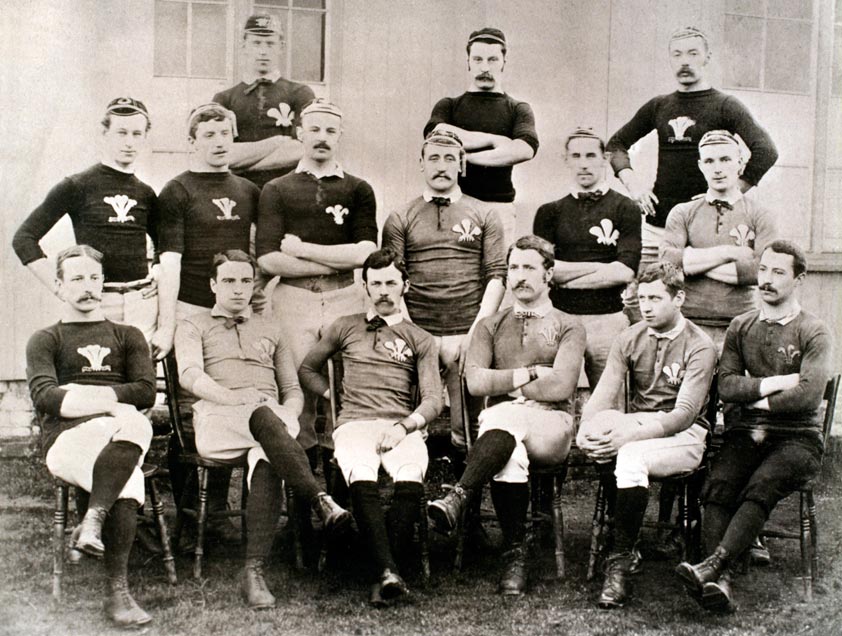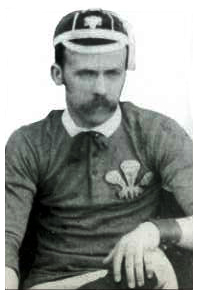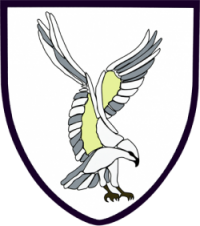Club Captain : George Morris
Capped v England : William Gwynn (d), George Morris, Frederick Andrews (d)
Capped v Scotland : William Gwynn, George Morris, Frederick Andrews
Capped v Ireland : William Gwynn, Samuel Goldsworthy (d)
(d) = International debut, (c) = captain of international side.
For the third consecutive season Swansea’s first International cap George Lockwood Morris captained the first fifteen with Bill Gwynn as his Vice-Captain.
In 1883-84 Morris oversaw a season where Swansea’s talented half back William Gwynn was capped for the first time in the fixture against England at Leeds (thus following in the footsteps of his brother David Gwynn). This was in fact the first time that Wales had played the other three ‘Home Countries’ in one season. The English game was lost but much vocal support for Wales was heard from the English home crowd who were smarting at the absence of a single Yorkshireman in the England side! Gwynn’s safe handling and distribution (which he honed at St Helens as a result of his cricket and soccer playing prior to joining the rugby Club) were much admired and led to his selection in the remaining two Internationals of the season against Scotland and Ireland. The Scottish match was lost at Newport in part due to a rare Gwynn error late on, where he beat the Scots defence then dropped the ball over their tryline. George Lockwood Morris, who joined Gwynn against England, played for Wales for the last time in the Scottish game with his place as Swansea’s first International cap already established.
Swansea forward Frederick Andrews gained his two caps this season against England and Scotland. The Irish were beaten at Cardiff. Samuel Goldsworthy was a prominent member of the Swansea Workingmens’ Club which still held strong links to The Whites as a breeding ground for players. As a Swansea player this season, Goldsworthy also gained his first cap in the game against Ireland.
The game was changing from its earlier free for all dust-ups and with the 1878 ‘down rule’, a player now had to release the ball on being tackled which helped develop the distinction in play between forwards such as E.S. Richards and gave opportunity for inventive backs like Gwynn to create scoring breaks.

Wales team v Scotland 1884
The Wales team that played Scotland at Rodney Parade, Newport on 12th January 1884. Scotland won by 1 try and 1 drop goal to nil.
Back Row (L to R): H J Simpson (Cardiff), F L Margrave (Llanelli), W D Phillips (Cardiff).
2nd Row (L to R): G L Morris (Swansea), T B Jones (Newport), H S Lyne (Newport), T J S Clapp (Newport), F G Andrews (Swansea), R Gould (Newport).
Front Row (L to R): C H Newman (Newport) , C P Allen (Beaumaris/Oxford Univ.), W H Gwynn (Swansea), C P Lewis (Llandovery) [captain], C G Taylor (Ruabon/Blackheath), W B Norton (Cardiff).
(Courtesy WRU Archives)

William Henry Gwynn played as a half-back for Wales on 5 occasions between 1884 and 1885 and will be remembered for being one of the first and most able advocates of the passing game. He later became the WRU’s 1st paid secretary (1892 – 1896) and was also an International Rugby Football board representative (1892 – 1895).
He made his debut for Swansea in 1880, was Vice-Captain to George Morris during 1883-84 and captained them for 2 seasons (1884/85 and 1885/86). He later assisted with the club’s administration and served as a coach on several occasions.
On 13 May 1893, he refereed the 1st ever soccer match between Swansea Town and Cardiff City on the Vetch field. He also played cricket for Swansea and Glamorgan.
